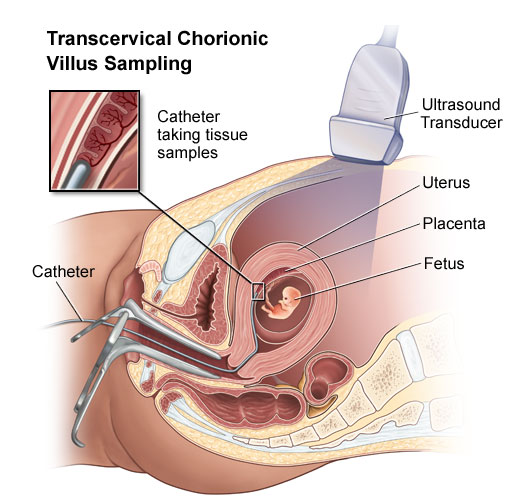Chorionic villus sampling (CVS) is a prenatal test that involves taking a sample of some of the placental tissue. This tissue contains the same genetic material as the fetus, and it can be tested for chromosomal abnormalities and some other genetic problems. There are other types of tests that can screen for genetic defects and disorders, and they may be offered depending on the family history and availability of laboratory testing.
Unlike amniocentesis (another type of prenatal test), CVS does not provide information on neural tube defects like spina bifida. For this reason, women who undergo CVS also need a follow-up blood test between 16 to 18 weeks of their pregnancy to screen for neural tube defects.
How is CVS performed?
CVS may be offered to women who are at increased risk for having a child with chromosomal abnormalities. It may also be offered to women who have a family history of a genetic defect that can be detected from the placental tissue. CVS is usually performed between the 10th and 12th weeks of pregnancy. Although exact methods can vary, the procedure involves inserting a catheter (narrow tube) through a woman's vagina and into her cervix. The test can be done through the vagina using a catheter or through the wall of the abdomen using a needle.
If it is done through the vagina, the technician or doctor will use an ultrasound to guide the catheter through the vagina and place it near the placenta. Once the catheter is in place, he or she will use a syringe attached to the catheter to gather cells from the placenta.
If CVS is done transabdominally (through the abdomen wall), the technician or doctor will insert a long, thin needle through the abdomen into the uterus and remove a sample of placental cells.
Once the tissue samples have been gathered, they will be sent to a genetic laboratory to be analyzed. Results are normally available in about 10 to 14 days.
Women may feel some cramping during and after a CVS procedure.
Potential limitations of CVS testing
Women who are pregnant with twins or other multiples usually need sampling from each placenta to test each child. However, because of the complexity of the procedure and positioning of the placentas, CVS may not be feasible or successful with multiples.
In some cases an active vaginal infection, such as herpes or gonorrhea, can prohibit the procedure. Other times the doctor can obtain a sample that does not have enough tissue to grow in the laboratory, causing results to be incomplete or inconclusive.
If testing isn’t successful or cannot be done, women will likely require a follow-up amniocentesis.